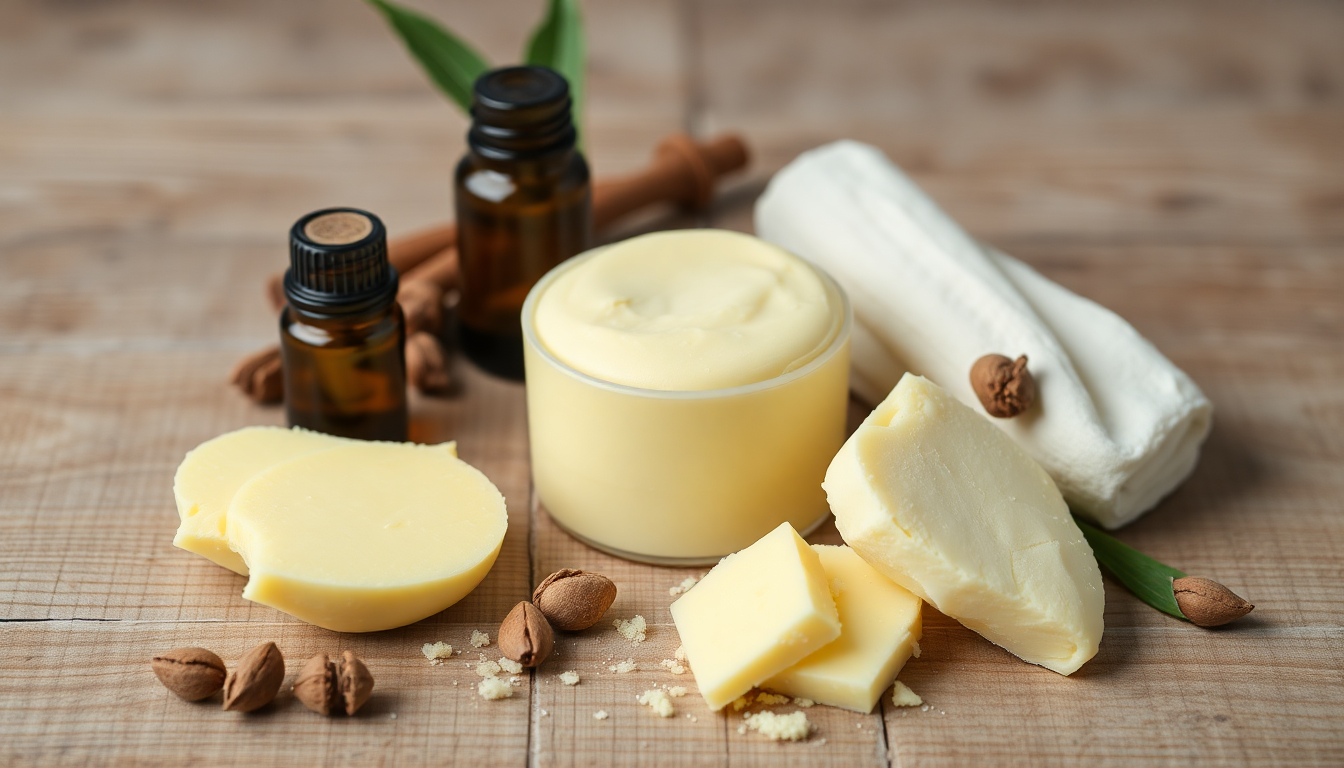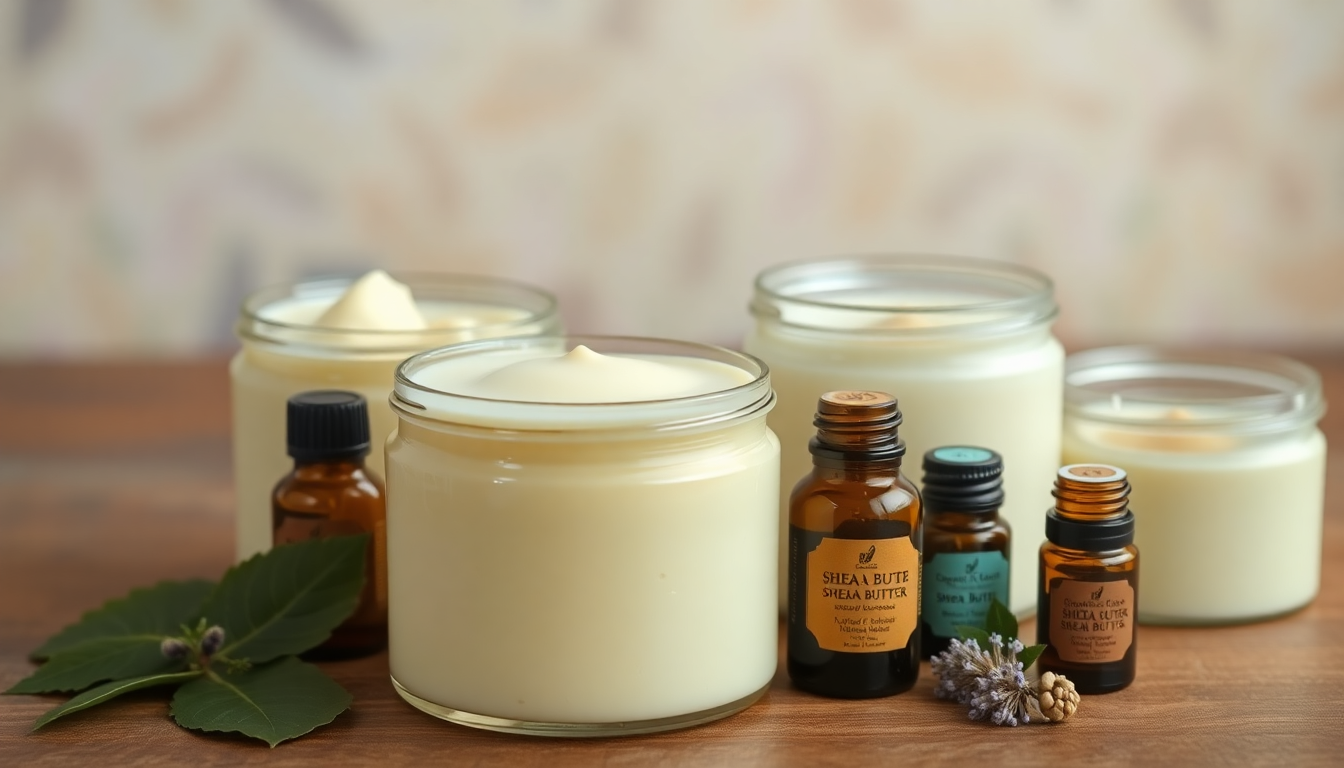Introduction
As we embrace the beauty trends of 2025, one aspect remains paramount: the desire for healthy, glowing skin. In the realm of skincare, exfoliation is a critical step that cannot be overlooked. With the increasing shift towards natural and organic ingredients, this article highlights the powerful combination of organic shea butter and aromatic essential oils for effective exfoliation techniques. Not only do these ingredients help in achieving a luminous complexion, but they also nourish and protect the skin.
Understanding Exfoliation
Exfoliation is the process of removing dead skin cells from the surface of your skin. This routine is essential for maintaining skin health and achieving a radiant appearance. It can be performed through mechanical means (scrubs, brushes) or chemical methods (acids, enzymes). In this article, we will focus on the natural mechanical exfoliation techniques using shea butter and essential oils.
Why Exfoliation is Essential for Healthy Skin
- Removal of Dead Skin Cells: Regular exfoliation helps to slough off dead skin cells, revealing the fresh, youthful skin underneath. This is particularly important as the skin's natural turnover rate slows down with age.
- Improved Skin Texture: Exfoliating can make your skin feel smoother and look more radiant. A consistent exfoliation routine can diminish rough patches and promote an even skin tone.
- Enhanced Absorption: By removing the upper layer of dead skin, your skin can better absorb the beneficial nutrients from moisturizers and serums, maximizing their effectiveness.
- Unclogged Pores: Exfoliation helps to prevent clogged pores, reducing the likelihood of breakouts and acne.
- Stimulated Circulation: The act of exfoliating encourages blood circulation, which can promote a healthy glow and support skin regeneration.
- Brighter Complexion: Regular exfoliation can enhance your skin’s natural radiance, making it look more vibrant and youthful.
Benefits of Organic Shea Butter
Organic shea butter, derived from the nuts of the shea tree, is a powerhouse of nutrients for the skin. Here are some key benefits:
- Moisturizing Properties: Shea butter is rich in fatty acids, making it an excellent moisturizer for all skin types. It penetrates deeply to hydrate the skin without clogging pores.
- Anti-inflammatory Effects: It contains compounds like cinnamic acid that can soothe irritation and reduce redness, making it suitable for sensitive skin.
- Rich in Vitamins: Packed with vitamins A and E, shea butter promotes skin healing and rejuvenation, helping to fade scars and improve skin tone.
- Antioxidant Protection: The antioxidants in shea butter help protect the skin from environmental stressors and free radicals, which can lead to premature aging.
- Supports Skin Elasticity: Regular use of shea butter can improve skin elasticity, helping to prevent sagging and promote a firmer appearance.
Choosing the Right Essential Oils
Essential oils add not only delightful aromas but also a plethora of skin benefits. Consider the following when selecting essential oils for your exfoliation routine:
- Lavender: Known for its calming properties, lavender essential oil can soothe the skin and reduce inflammation. It is also excellent for promoting relaxation and reducing stress.
- Tea Tree: This oil has powerful antibacterial properties, making it great for those with acne-prone skin. It helps to unclog pores and prevent breakouts.
- Frankincense: Renowned for its anti-aging benefits, frankincense can help reduce the appearance of fine lines and improve skin tone by promoting cellular regeneration.
- Rosemary: This essential oil is known for its ability to stimulate circulation, which can enhance the skin's overall appearance and vitality.
- Geranium: Geranium oil balances skin oil production, making it suitable for both dry and oily skin types. It also has a lovely floral scent that can uplift your mood.
Effective Exfoliation Techniques
Now that we understand the benefits of shea butter and essential oils, let's explore some simple yet effective techniques to incorporate these elements into your exfoliation routine:
1. DIY Shea Butter Scrub
- Ingredients: 1 cup of organic shea butter, 1/2 cup of sugar (brown or white) or sea salt, 10-15 drops of your chosen essential oil.
-
Instructions:
- In a mixing bowl, combine the shea butter and sugar/salt until well blended.
- Add the essential oil and mix thoroughly.
- Apply to damp skin in a circular motion, focusing on areas prone to roughness, such as elbows and knees.
- Rinse thoroughly with warm water and pat dry.
2. Shea Butter Exfoliating Mask
- Ingredients: 1/2 cup of shea butter, 1 tablespoon of honey, 5 drops of essential oil.
-
Instructions:
- In a bowl, mix the shea butter with honey until smooth.
- Add the essential oil and stir to combine.
- Apply the mixture to your face and neck, avoiding the eye area.
- Leave it on for 15-20 minutes before rinsing off with warm water.
3. Gentle Daily Exfoliation
For daily care, consider using a gentle exfoliating cleanser that contains shea butter and essential oils. Look for products that are sulfate-free and made with natural ingredients to maintain your skin’s health. This will allow you to exfoliate without overdoing it, which can lead to irritation.
4. Spa Day at Home
Sometimes, we all need a little pampering. Create a spa-like experience at home with the following steps:
- Run a warm bath and add a few drops of your favorite essential oil to the water.
- While soaking, apply a shea butter scrub to your body, focusing on rough areas.
- After exfoliation, apply a nourishing body oil or lotion to lock in hydration.
- Take time to relax and enjoy the soothing scents around you.
Tips for Successful Exfoliation
To maximize the benefits of your exfoliation routine, keep the following tips in mind:
- Know Your Skin Type: Understanding whether you have dry, oily, or sensitive skin will guide you in choosing the right products and techniques.
- Frequency Matters: Exfoliate 1-3 times a week depending on your skin type. Over-exfoliation can lead to irritation and sensitivity.
- Patch Test New Ingredients: Always perform a patch test when trying new essential oils or scrubs to ensure no allergic reactions occur.
- Hydrate: After exfoliation, apply a good moisturizer to keep your skin hydrated and promote healing.
- Protect Your Skin: Always use sunscreen after exfoliating, as your skin may be more sensitive to the sun.
Conclusion
In 2025, the natural skincare movement continues to flourish, emphasizing the importance of ingredients that are safe, effective, and environmentally friendly. By incorporating organic shea butter and aromatic essential oils into your exfoliation regimen, you can achieve a glowing complexion while nourishing and protecting your skin. Remember that consistency is key; by making exfoliation a regular part of your skincare routine, you'll enjoy the benefits of brighter, healthier skin all year round. So go ahead, indulge in these natural techniques and let your skin shine!




Dejar un comentario
Este sitio está protegido por hCaptcha y se aplican la Política de privacidad de hCaptcha y los Términos del servicio.